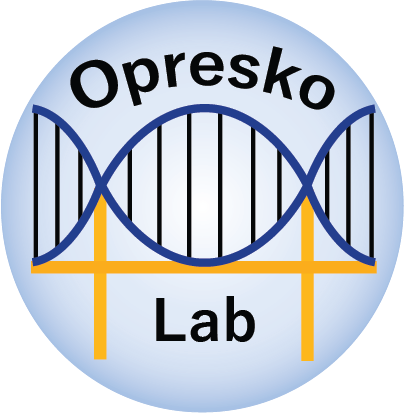Frontiers 8-Oxoguanine Review
Dr. Mariarosaria De Rosa’s review “Roles for the 8-Oxoguanine DNA Repair System in Protecting Telomeres From Oxidative Stress” was published in Frontiers Cell and Developmental Biology journal today. This article details the effects 8-oxoguanine, one of the most common forms of oxidative DNA base damage, has on telomere integrity, as well as the system which manages this damage termed the “guanine oxidation” or GO system and its function at telomeres.
Here, the authors propose a hormesis model of telomere maintenance by 8-oxoG wherein low levels of reactive oxygen species (ROS) produce a small number of oxidized guanines which reduces the ability for G4 quadruplexes to form and thus, allows for telomere lengthening. Conversely, high levels of ROS results in more 8-oxoG formation which then impairs telomere maintenance, inhibits telomerase, and decreases telomere stability.
Samuel Johnson, a grad student in the lab, contributed to this review by detailing G4 quadruplexes, a secondary structure telomeres are highly likely to form due to their repetitive sequences and long runs of guanines.
For more information, see Abstract and link to the article below!
Abstract: Telomeres are protective nucleoprotein structures that cap linear chromosome ends and safeguard genome stability. Progressive telomere shortening at each somatic cell division eventually leads to critically short and dysfunctional telomeres, which can contribute to either cellular senescence and aging, or tumorigenesis. Human reproductive cells, some stem cells, and most cancer cells, express the enzyme telomerase to restore telomeric DNA. Numerous studies have shown that oxidative stress caused by excess reactive oxygen species is associated with accelerated telomere shortening and dysfunction. Telomeric repeat sequences are remarkably susceptible to oxidative damage and are preferred sites for the production of the mutagenic base lesion 8-oxoguanine, which can alter telomere length homeostasis and integrity. Therefore, knowledge of the repair pathways involved in the processing of 8-oxoguanine at telomeres is important for advancing understanding of the pathogenesis of degenerative diseases and cancer associated with telomere instability. The highly conserved guanine oxidation (GO) system involves three specialized enzymes that initiate distinct pathways to specifically mitigate the adverse effects of 8-oxoguanine. Here we introduce the GO system and review the studies focused on investigating how telomeric 8-oxoguanine processing affects telomere integrity and overall genome stability. We also discuss newly developed technologies that target oxidative damage selectively to telomeres to investigate roles for the GO system in telomere stability.

